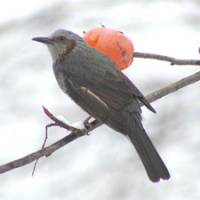* Japanese name: Hiyodori
* Scientific name: Ixos amaurotis
* Description: These are medium-size songbirds that grow to about 28 cm long. They are mainly olive brown with a white face and eyebrow, throat and belly; they have a small crest. The bill, feet and eyes are black. Males and females look the same. Bulbuls are boisterous, active birds with a range of songs; they can imitate other species, too. They are gregarious, and can often be seen in large flocks.
* Where to find them: In woodland and parkland the length of Japan, from Hokkaido to Kyushu. In fall and winter, bulbuls migrate to new feeding grounds, often flying low out at sea to avoid predation by falcons.
* Food: In summer, bulbuls eat insects, but during winter they eat fruit. They can often be seen feasting on the nectar of camellia flowers, which leaves their faces dusted yellow with pollen. This is actually a service to the plant, which blooms in winter and -- in the absence of insects -- needs birds for pollination. To this end, the flowers produce tough petals with deep reservoirs of nectar. Bulbuls also eat, and disperse, nuts from various trees. When feeding on laurel, they will check the maturity of the nut before eating it (scratched laurel nuts on the ground have probably been rejected by bulbuls). The birds are not friends of farmers, however, as in group feeding frenzies they sometimes damage orchards, as well as crops of cabbage, cauliflower and spinach.
* Special features: Brown-eared bulbul females lay up to five purple-pink eggs in open nests in trees. The female incubates the eggs, but sometimes briefly leaves the nest to feed -- which is when disaster can strike. Cuckoos are waiting for just this moment, and may swoop in and lay (with almost indecent haste) their own egg in the bulbul's nest, ditching one of the eggs already there. If the bulbul hosts don't notice the switch, they'll end up raising a large chick of the wrong species. What's worse, the cuckoo chick, when it hatches, instinctively pushes out of the nest anything else it finds. Working hard to the sound of their own beautiful song, the unfortunate host Brown-eared bulbuls raise a giant parasitic cuckoo at the cost of their own brood.
6 hours ago


















With your current subscription plan you can comment on stories. However, before writing your first comment, please create a display name in the Profile section of your subscriber account page.